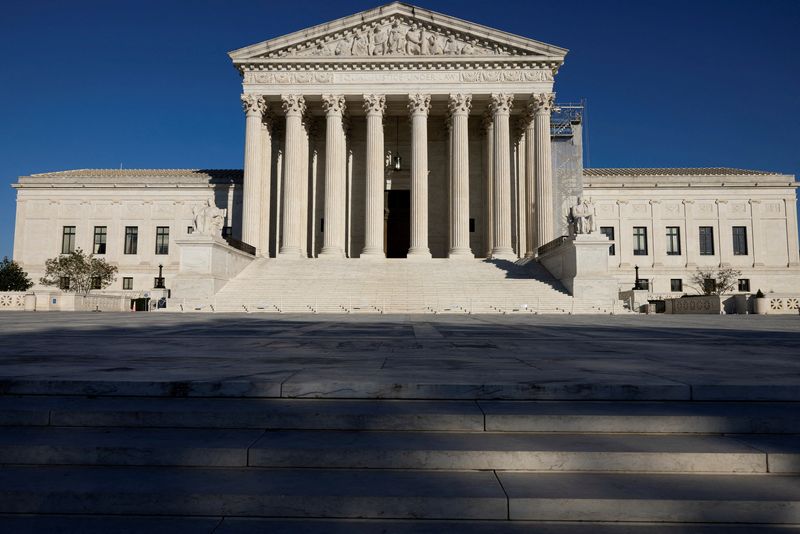By Andrew Chung, John Kruzel
WASHINGTON (Reuters) -The U.S. Supreme Court appeared inclined on Tuesday to limit the extent to which federal agencies must review the environmental impact of projects they regulate in a dispute over a proposed railway in Utah meant to carry crude oil that was challenged by environmental groups and a Colorado county.
The court heard arguments in an appeal by a coalition of seven Utah counties and an infrastructure investment group of a lower court's decision that halted the project and faulted the environmental impact statement issued by a federal body called the Surface Transportation Board in approving the railway.
The counties are seeking to construct an 88-mile (142-km) railway line in northeastern Utah to connect the sparsely populated Uinta Basin region to an existing freight rail network that would be used primarily to transport waxy crude oil.
Conservative and liberal justices asked questions that indicated the lower court might have overreached in concluding that the board failed to adequately investigate the railway's impacts on vegetation and wildlife in the basin and air quality in Gulf Coast communities where it would be refined.
The case tests the scope of environmental impact studies that federal agencies must conduct under a U.S. law called the National Environmental Policy Act, enacted in 1970 to prevent environmental harms that might result from major projects. The law mandates that agencies examine a project's "reasonably foreseeable" effects.
The board, which has regulatory authority over new railroad lines, issued an environmental impact statement and approved the coalition's proposal in 2021.
Liberal Justice Ketanji Brown Jackson told William Jay, a lawyer for the challengers, that the board would not have the power to prevent oil from being transported on the railway since it regulates railroads, not cargo.
"If they can't say what gets carried, then what difference does it make that the refinery is putting out environmental effects, to their decision as to whether or not to approve this?" Jackson asked.
Jay said it matters because one of the things the law at issue requires agencies to do "is to look at the foreseeable consequences, even when they cannot be mitigated."
Conservative Justice Brett Kavanaugh expressed concern that judicial second-guessing has prompted agencies to carry out sprawling environmental reviews.
"By the courts taking an overly aggressive role it's, in turn, created an incentive for the agencies to do 3,000-page ... environmental impact statements," Kavanaugh told Edwin Kneedler, a Justice Department lawyer, who agreed.
Democratic President Joe Biden's administration backed the railway coalition in the case, as did Utah.
Environmental reviews that are too vast can add years to the regulatory timeline, risking a project's viability and future infrastructure development, according to companies and business trade groups.
"Infrastructure requires investment, and for investors time is money. Project opponents, by contrast, know that time is on their side and a remand just for a little more process can kill a project," Paul Clement, a lawyer for the coalition, told the justices.
Some justices seemed concerned that the legal test proposed by Clement for determining the scope of environmental review could be too narrow, given that an action could have effects beyond the local confines of a project.
Clement urged the court to rule that an agency's review need only to account for potential impacts that might occur close in time and geography to a proposed project, and that do not fall under the regulatory authority of another agency.
Liberal Justice Sonia Sotomayor told Clement: "You want absolute rules that make no sense."
Jackson said the test "feels to me to be unmoored" from the purposes of the environmental review law.
The Center for Biological Diversity and other environmental groups sued over the board's decision to allow the project, as did Eagle County, Colorado, noting that the project would increase train traffic in its region and double traffic on an existing rail line along the Colorado River.
The U.S. Circuit Court of Appeals for the District of Columbia Circuit ruled in favor of the challengers in 2023.
Fifteen other states supported the challengers. Colorado said its economy relies on outdoor recreation, and that the project raises the risk of leaks, spills or rail car accidents near the Colorado River's headwaters.

Conservative Justice Neil Gorsuch recused himself from the case after some Democratic lawmakers urged his withdrawal because businessman Philip Anschutz, his former legal client, has a financial interest in its outcome.
A ruling in the case is expected by the end of June.